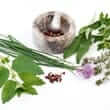Background
- Carqueja (Baccharis trimera) is a shrub-like plant native to South America. Carqueja has been popularly used in Brazil to treat liver disease, joint disease, and diabetes. Although carqueja has been used for centuries in Brazil, the first recorded use of carqueja as a medicinal herb was in 1931.
- Although not well studied in humans, preliminary results suggest that some extracts of carqueja may help lower high levels of blood sugar. There is not enough scientific evidence to support the use of carqueja to treat any condition in humans.
References
Natural Standard developed the above evidence-based information based on a thorough systematic review of the available scientific articles. For comprehensive information about alternative and complementary therapies on the professional level, go to . Selected references are listed below.
- Abad MJ, Bermejo P, Gonzales E, et al. Antiviral activity of Bolivian plant extracts. Gen Pharmacol 1999;32(4):499-503.
View Abstract - Betoni JE, Mantovani RP, Barbosa LN, et al. Synergism between plant extract and antimicrobial drugs used on Staphylococcus aureus diseases. Mem.Inst.Oswaldo Cruz 2006;101(4):387-390.
View Abstract - Dickel ML, Rates SM, Ritter MR. Plants popularly used for loosing [sic] weight purposes in Porto Alegre, South Brazil. J Ethnopharmacol 2007;109(1):60-71.
View Abstract - Gené RM, Cartaña C, Adzet T, et al. Anti-inflammatory and analgesic activity of Baccharis trimera: identification of its active constituents. Planta Med 1996;62(3):232-235.
View Abstract - Hnatyszyn O, Moscatelli V, Garcia J, et al. Argentinian plant extracts with relaxant effect on the smooth muscle of the corpus cavernosum of guinea pig. Phytomedicine 2003;10(8):669-674.
View Abstract - Januário AH, Santos SL, Marcussi S, et al. Neo-clerodane diterpenoid, a new metalloprotease snake venom inhibitor from Baccharis trimera (Asteraceae): anti-proteolytic and anti-hemorrhagic properties. Chem Biol Interact 2004;150(3):243-251.
View Abstract - Mendes FR, Tabach R, Carlini EA. Evaluation of Baccharis trimera and Davilla rugosa in tests for adaptogen activity. Phytother Res 2007;21(6):517-522.
View Abstract - Oliveira AC, Endringer DC, Amorim LA, et al. Effect of the extracts and fractions of Baccharis trimera and Syzygium cumini on glycaemia of diabetic and non-diabetic mice. J Ethnopharmacol 2005;102(3):465-469.
View Abstract - Pádua Bda C, Silva LD, Rossoni Júnior JV, et al. Antioxidant properties of Baccharis trimera in the neutrophils of Fisher rats. J Ethnopharmacol 2010;129(3):381-6.
View Abstract - Paul EL, Lunardelli A, Caberlon E, et al. Anti-inflammatory and immunomodulatory effects of Baccharis trimera aqueous extract on induced pleurisy in rats and lymphoproliferation in vitro. Inflammation 2009;32(6):419-25.
View Abstract - Rodrigues CR, Dias JH, de Mello RN, et al. Genotoxic and antigenotoxic properties of Baccharis trimera in mice. J Ethnopharmacol 2009;125(1):97-101.
View Abstract - Simões-Pires CA, Queiroz EF, Henriques AT, et al. Isolation and on-line identification of antioxidant compounds from three Baccharis species by HPLC-UV-MS/MS with post-column derivatisation. Phytochem Anal 2005;16(5):307-314.
View Abstract - Soicke H, Leng-Peschlow E. Characterisation of flavonoids from Baccharis trimera and their antihepatotoxic properties. Planta Med 1987;53(1):37-39.
View Abstract - Torres LM, Gamberini MT, Roque NF et al. Diterpene from Baccharis trimera with a relaxant effect on rat vascular smooth muscle. Phytochemistry 2000;55(6):617-619.
View Abstract - Xavier AA, Peckolt OL, Canali J. [Effect of an extract of Baccharis genistelloides Person on the glucose level of the blood]. C.R.Seances Soc.Biol Fil 1967;161(4):972-974.
View Abstract







